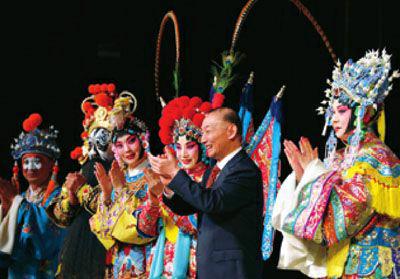Theatrical Diplomacy
2014-09-23ByCorrieDosh
By+Corrie+Dosh
‘If we want to protect real world peace, humanity must mutually understand, mutually tolerate and sympathize, mutually assist and not battle.”
Eighty-four years ago, Chinese folk hero and Peking Opera master Mei Lanfang spoke these words to the graduating class of the University of Southern California, calling for peace amid an epic six-month tour of the United States aimed at building cultural understanding. The performances of classic Peking Opera or Jingju—which inspired J. Brooks Atkitson of The New York Times to lavish praise on Mei Lanfangs “exquisite loveliness in pantomime and costume”—were hailed by international media as diplomatic triumphs and the sign of a new phase in Chinese-American relations.
Much has changed since Mei Lanfang electrified New York audiences with his stories of female warriors, tragic romances and royal intrigue, all of which rivaled Shakespeares greatest works. The master started a school—the Mei School—and took his place among the pantheon of internationally recognized artistic legends. Since then, the relationship between China and the United States has grown tremendously in ways that could not have been imagined 84 years ago.
Celebrating the 120th anniversary of Mei Lanfangs birth, the Jingju Theater Co. of Beijing brought a selection of the masters greatest works to New Yorks Lincoln Center and the Kennedy Center in Washington, D.C., throughout late August. The performances were a nostalgic, yet somehow timely, reminder of the noble power of the fine arts.
Just as before, the works of Mei Lanfang electrified audiences in New York. From the moment the lovely performer Dou Xiaoxuan stepped on stage as the goddess Apsara, scattering flower petals on the wind, the audience at the David H. Koch Theater sat enraptured. Dou deftly whirled and flung the long silk sleeves of her traditional gown about the stage, seemingly delicate yet powerful. The high pitch of traditional Peking Opera, still unfamiliar to many Westerners, was a novelty, and subtitles translated the lyrics for English speakers. Acrobats tumbled around a dancing clam in Pierce the Mussel and Shang Wei, the lead performer in the stage production of Farewell My Concubine, was praised by The New York Times as “captivating” and the “picture of stoic, stylized beauty.”
“I have never seen anything like this before,” said Diane Webster, a New York theater patron who had been invited to the performance by her daughter. “I love the costumes and the tumbling. Its fun. I wouldnt say I understand everything that is going on—but I like it.”endprint
